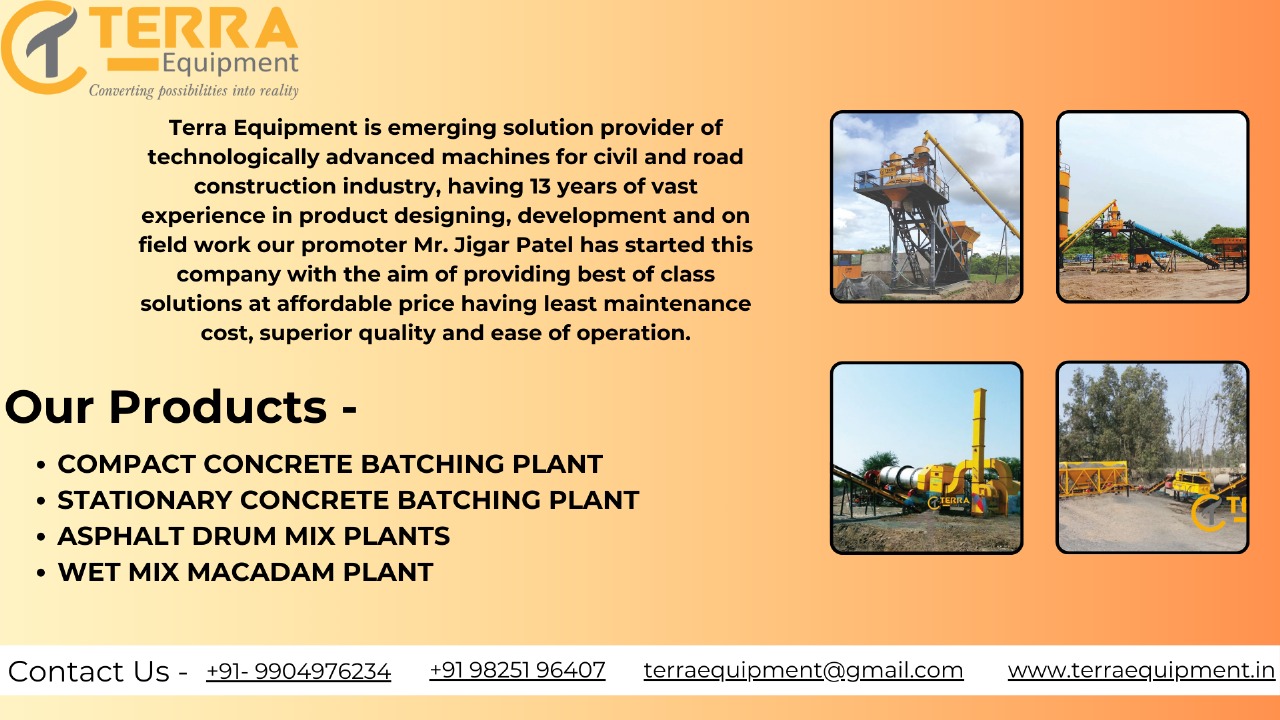Compact Concrete Batching Plant
A CompactConcrete Batching Plant is a type of concrete production facility designed
for small to medium-scale construction projects. Unlike traditional,
large-scale plants, compact plants are built to be more space-efficient and
portable while still providing high-quality concrete in a variety of
applications. These plants combine all the essential equipment needed for
mixing and producing concrete into a compact unit that is easy to transport,
set up, and operate.
The
compact design typically includes key components like aggregate feeders, cement
silos, mixers, control panels, and conveyor belts, all within a small
footprint. This makes them ideal for areas where space is limited or for
projects requiring flexibility in moving the plant to different locations.
Key
advantages of compact concrete batching plants:
- Portability: Easily moved to different
job sites.
- Space efficiency: Ideal for smaller spaces
and urban areas.
- Quick Setup: Can be installed and
started in a short period.
- Cost-Effective: Lower upfront cost compared
to larger, traditional batching plants.
- High-Quality Concrete
Production:
Capable of producing precise and high-quality concrete mixtures.
10 Frequently Asked Questions (FAQs) About Compact
Concrete Batching Plants:
- What is a Compact Concrete
Batching Plant?
- A compact concrete batching plant is a smaller, more portable
version of a traditional concrete plant, designed to produce high-quality
concrete in limited space and for small to medium-scale projects.
- How much space is needed to
install a Compact Concrete Batching Plant?
- The space required varies
depending on the model, but typically, compact plants need less than 200
square meters of land area, making them ideal for smaller construction
sites.
- What are the benefits of
using a Compact Concrete Batching Plant?
- Benefits include reduced
space requirements, mobility, lower initial investment, faster
installation, and the ability to produce consistent, high-quality
concrete.
- Can a Compact Concrete
Batching Plant be used for large projects?
- While compact plants are
primarily designed for small to medium-scale projects, they can be used
for larger ones if the required output is within the plantís capacity.
- How does the mixing process
work in a Compact Concrete Batching Plant?
- The plant combines
aggregates, cement, water, and additives in a controlled environment
using an automatic or manual batching system. The materials are mixed
thoroughly in a drum or planetary mixer before being discharged.
- What is the typical capacity
of a Compact Concrete Batching Plant?
- Compact batching plants generally have capacities
ranging from 25 to 60 cubic meters per hour, depending on the model and
configuration.
- Is a Compact Concrete
Batching Plant easy to transport?
- Yes, compact batching
plants are designed to be easily disassembled, transported, and set up at
different job sites, making them ideal for projects that require
mobility.
- How long does it take to set
up a Compact Concrete Batching Plant?
- The setup time can range
from a few hours to a couple of days, depending on the plant's complexity
and the site conditions.
- What maintenance is required
for a Compact Concrete Batching Plant?
- Regular maintenance
includes cleaning mixers, checking for wear and tear on conveyor belts,
inspecting electronic components, and ensuring proper calibration of batching
systems.
- Is a Compact Concrete
Batching Plant energy-efficient?
- Yes, many modern compact
batching plants are designed with energy efficiency in mind, including
the use of advanced electrical systems and eco-friendly technologies to
minimize energy consumption.
Applications of Compact Concrete Batching Plants:
- Construction Sites with
Limited Space:
- Due to their compact size,
these plants are perfect for construction sites where space is
constrained, such as urban areas or smaller, specialized projects.
- Residential Construction:
- Ideal for small residential
projects requiring a limited amount of concrete, such as houses, garages,
or driveways.
- Road Construction:
- These plants can be used on
road construction sites to supply concrete for pavements, curbs, and
small bridges where mobility and quick setup are important.
- Small-Scale Infrastructure
Projects:
- Used in projects like
school buildings, parks, and community centers, where the volume of
concrete required is moderate, and a compact plant is sufficient.
- Precast Concrete Production:
- They are suitable for small
to medium precast concrete production units where efficient and
consistent concrete mixing is essential for producing precast elements
like blocks, pipes, and slabs.
- Concrete for Paving and
Flooring Projects:
- Perfect for producing
high-quality concrete for paving stones, flooring tiles, or even
decorative concrete work for landscaping and outdoor installations.
- Ready-Mix Concrete for Local
Demands:
- Local construction companies or concrete suppliers can
use compact batching plants to meet local demand for ready-mix concrete
on small to medium projects.
- Remote Locations and
Temporary Projects:
- Compact plants can be quickly set up at
remote or temporary sites, such as mining operations, camps, or fieldwork
that require periodic concrete production.
- Dam and Irrigation Works:
- For medium-sized dams or
irrigation systems where mobility and quick installation are essential, a
compact concrete batching plant offers flexibility.
- Concrete for Agricultural
Projects:
- These plants can be used in
agricultural projects that require concrete for building silos,
irrigation systems, and other farming infrastructure.
Conact us more detail :
Call - +91
98251 96407, +91- 9904976234
Email - terraequipment@gmail.com
Address - Survey No- 231, Dediyasan Village, Opp Lilaba Weigh Bridge , Mehsana
-384002 Gujarat

